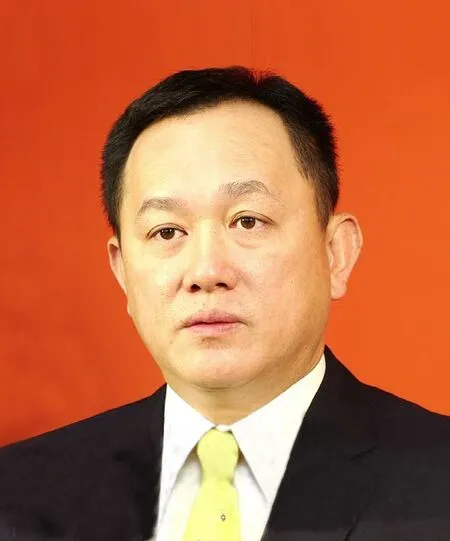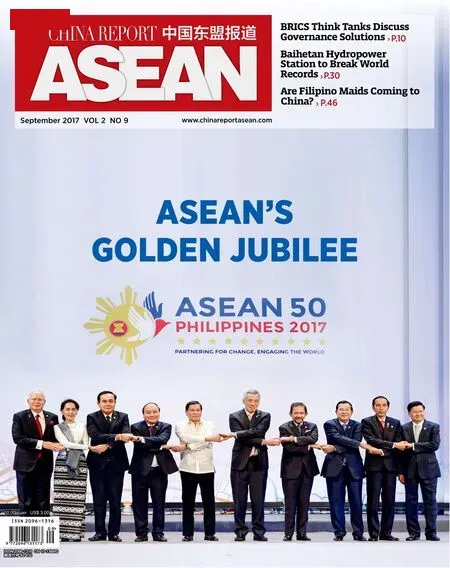STANLEY KANG: CHINA, THAILAND CAN GO GLOBAL TOGETHER
By Wu Xiaohan, Tao Hai
STANLEY KANG: CHINA, THAILAND CAN GO GLOBAL TOGETHER
By Wu Xiaohan, Tao Hai
Chairman of the Thai Joint Foreign Chambers of Commerce argues that Thailand can learn much from China’s development experience

Stanley Kang, Chairman of the Joint Foreign Chambers of Commerce in Thailand.
"The Thailand 4.0 economic development strategy vigorously carried out by the Thai government is similar to the Belt and Road Initiative strongly promoted by the Chinese government," explained Stanley Kang, Chairman of the Joint Foreign Chambers of Commerce in Thailand (JFCCT), in an interview withChina Report ASEAN. "China and Thailand have many things in common in a number of areas. We look forward to further cooperation."
China's Rapid Development Recognized
Kang, a famous ethnic-Chinese businessman in Thailand, won the election for chairman of the JFCCT when he was 46. After holding the post for three years, Kang is now the first Asian chairman the JFCCT has had since it was founded 40 years ago. As chairman, Kang has paid close attention to Chinese enterprises' development in Thailand and has conducted in-depth studies into China’s politics and economics to explore China’s economic development patterns over the course of the past 30 years. The JFCCT regularly submits economic information to the Thai president and government, providing policy suggestions and valuable information from a unique perspective.
On June 24, Kang was invited to the 2017 Belt and Road Capital Summit in Shanghai to discuss the international investment environment and enterprises' development prospects as a representative of ASEAN entrepreneurs. "China is developing rapidly, and Thai enterprises have missed the best development opportunities during its reform and opening-up,” Kang said.“But we won’t miss China’s decade of internationalization. The Belt and Road Initiative is a great opportunity for the common development of the two countries.”
As for the "new normal" proposed by Chinese President Xi Jinping, Kang explained: "China has completed its development and construction goals, which would take other countries a century to reach, in just 30 years. Today, China is building a prosperous society, its economy is growing steadily, and its people are living affluent lives. The term‘new normal’ first expressed by President Xi is accurate and meaningful. The economic new normal does not mean China is not developing further. China's development is still in a period of important strategic opportunity. The new trends in China's economic development have a deciding influence over macroeconomic policy and industrial transformation and upgrading. Under that background, the Chinese government has put forward the Belt and Road Initiative. This farsighted development strategy encourages state-owned and private enterprises alike to go abroad and actively carry out international operations. Justas Chinese Premier Li Keqiang said, the government should streamline administration and institute decentralization, inspire young people to innovate and start their own businesses and promote mass entrepreneurship and innovation. Supported by the government, China's economic development is full of potential."
Kang added that China’s enterprises still have some ways to go before they can fully complete their globalization efforts.
"In my view, the Belt and Road Initiative means that appropriate global leaders take the right path, and I believe Chinese enterprises can smoothly complete their globalization under the current frame of development," Kang said. "In the past 25 years, enterprises from around the world have brought investment to China. Their technologies and capital have driven its economic development. Therefore, it has rapidly become an economic power and the world leader in many areas. Over the course of the next 20 to 30 years, it will bring technology and capital to the world to achieve common development.”
Thailand 4.0 and Belt & Road
Kang said he believes that every country's economic development is expected to advance through four stages: agriculture, light industry, heavy industry and technological innovation.
"Generally, a country needs 60 to 100 years to complete such progress, but it only took China less than 30 years,” Kang said. “Its high rate of development is known around the world. Now, the new economic development strategy promoted by the Thai government is leading the country to the ‘4.0 stage’[technological innovation]. The government particularly stresses innovation and creativity. We need agriculture 4.0, service 4.0, tourism 4.0, trade 4.0, industry 4.0 and technology 4.0. Through innovation in all areas, the economy of every industry in Thailand will advance and develop harmoniously.”
Kang noted that the Chinese government has laid out a roadmap and timetable for economic development. For instance, China is entering into the stage of developing the 13th Five-Year Plan, which the Thai government can learn from. The JFCCT also advises the Thai government to make a long-term plan for economic development. Thai Prime Minister Prayut Chano-cha believes that "a country needs a plan to develop". Now, the Prayut administration has proposed plans and directions for Thai economic construction over the course of the upcoming 20 years, including outlines for the East Coast Corridor Development Zone and the 10 economic and trade development zones around it, as well as outlines for political, economic and civil reforms.
"Prime Minister Prayut has encouraged us to provide development proposals for the country. He said the country's development needs everyone's effort," Kang said. "The JFCCT submits aWhite Paper for Economic Development Adviceto the president every year. It carries out targeted investigations and big data analysis and expects the government to constantly improve economic policies. For example, foreign investment accounts for a large portion of investment in Thai industry, so the government should establish policies designed to enhance transparency, public trust and administrative efficiency to both stabilize and further attract investment.”
Kang points to China as a hotbed of innovation.
"We have entered the era of the shared global economy,”he explained. “Chinese entrepreneur Jack Ma has created a large internet business platform. His innovation has brought huge added commercial value, which has competitive advantages globally. Enterprises' innovation products that can bring economic benefit nationwide are the results of global sharing. For instance, Google and Facebook users are not just from the United States. Likewise, Jack Ma’s Alibaba no longer just serves Chinese netizens. Prime Minister Prayut has said that 'If you want to go fast, go alone. If you want to go far, go together.' Against the backdrop of globalization, the Belt and Road Initiative and Thailand’s 4.0 strategy will bring development opportunities for Sino-Thai cooperation. We hope the enterprises from the two countries can advance together along the path of internationalization.”
'Prime Minister Prayut has encouraged us to provide development proposals for the country. He said the country's development needs everyone's effort.'

